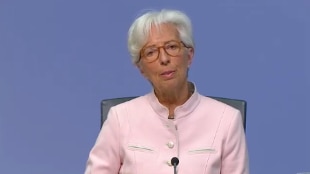- ECB bulletin: in Italy, France and Spain the strongest drop in GDP due to Covid-19
- Banks fly into the stock exchange, the ECB wants to facilitate mergers
Share
July 16, 2020 The worsening economic outlook in the United States, linked to the trend of the infections, "is certainly a cause for concern, but the scenario we have outlined takes into account these elements, as well as the risk of a second wave" of the pandemic. This was stated by the president of the ECB, Christine Lagarde, confirming the validity of the Eurotower economic forecasts which give for 2020 a -8.7% of GDP in the base scenario and a -13% in the worst case scenario. Lagarde also said that the set of monetary policy measures, from Pepp to liquidity, is currently "effective, adequate and working". The measures that the ECB has introduced since March will contribute 1.3 additional points to the eurozone's GDP by the end of 2022 and 0.8% inflation points in the same period of time."We foresee the complete use of Pepp"
"Our basic scenario still foresees the complete use" of the 1,350 billion euros of Pepp, the pandemic Qe. "If conditions improve faster than expected, this may change, but this is not the case at the moment." Christine Lagarde, president of the European Central Bank also specified that the slowdown in the weekly purchasing rhythm is due to the improvement in financial conditions and in particular "to the marked decrease in the risks of fragmentation" in the transmission of monetary policy.
More Bond Italy purchases for Pepp flexibility
The ECB was able to deviate from the capital keys due to the flexibility of Pepp thanks to which it was able to buy more Italian bonds than the ECB's share of capital held by the Bank of Italy. This was explained by the ECB president, Christine Lagarde, at a press conference. "There have been deviations: countries like Italy, Germany even if less, Portugal are above the capital key," he observed. "We will not allow convergence to the capital key to weaken the effectiveness" of central bank measures.
Recovery Fund
The Recovery Fund "must be approved as soon as possible. Our belief is that the recovery fund will see the light" and will be important to support the recovery and guide the green and digital turn. ECB president Christine Lagarde said this during a press conference in Frankfurt. In reference to the difficulty of the negotiation process, Lagarde explained that it is no surprise that for such important programs, which are "real game-changers", each tries to carry on his own position. Regarding the composition of the plan, Lagarde reaffirmed his hope that the plan will reach 750 billion and will be composed largely of non-repayable loans and to a lesser extent loans to help the countries and sectors most affected by the crisis.
"Eurozone needs broad monetary stimulus" Eurozone
still needs "broad monetary stimulus". The president of the ECB, Christine Lagarde said to add that in the meantime the latest data "indicate a recovery" of economic activity in the euro area after the collapses linked to the pandemic "even if the level of activity remains much lower than before of the pandemic. In May and June - he added - even with the loosening of the lockdowns, there was a significant but unequal recovery. In any case, the outlook remains highly uncertain ".
ECB ready to adapt its instruments
The Governing Council "continues to be ready to adapt all its instruments, as appropriate, to ensure that inflation moves towards its target sustainably, in line with its commitment to symmetry ".
Rates unchanged
The Governing Council "expects key ECB interest rates to remain at their current or lower levels until inflation prospects have started to converge firmly at a level close enough, but below 2%, and this convergence has been constantly reflected in the underlying inflationary dynamics ".
Continue with 20 billion Qe per month
Net purchases under the asset purchase program (App) will continue at a monthly rate of 20 billion euros, together with purchases under the additional temporary allocation of 120 billion euros, up to at the end of the year. The Governing Council continues to expect monthly net purchases to last until just before interest rates start to rise.

